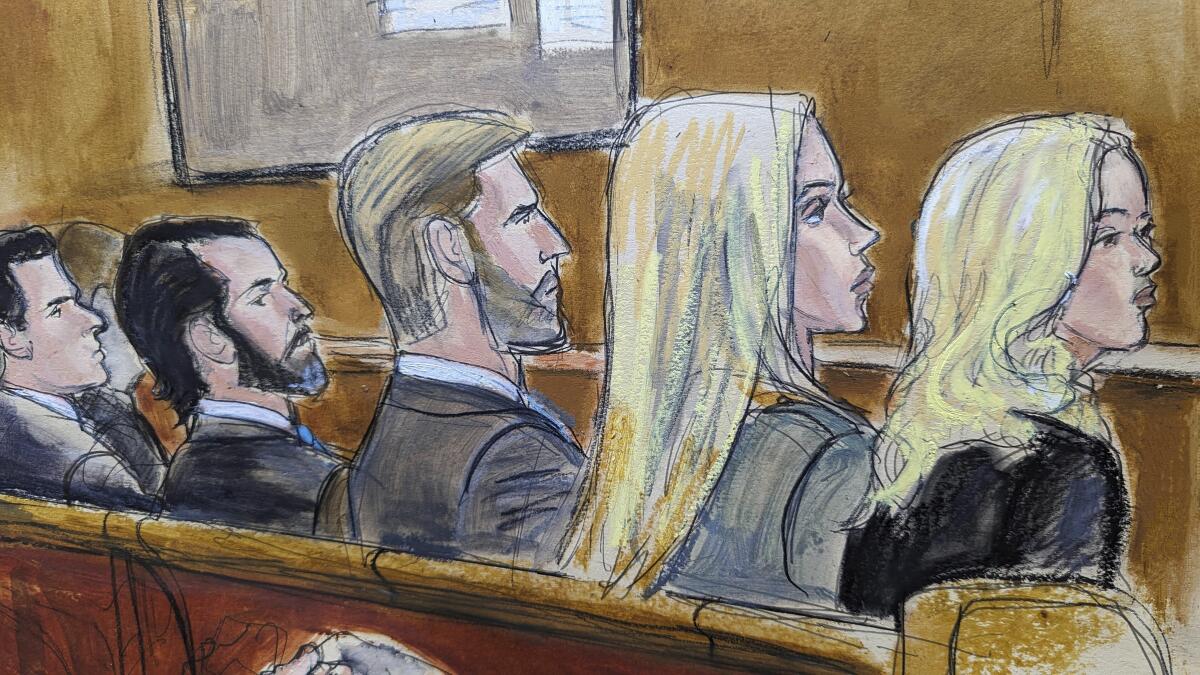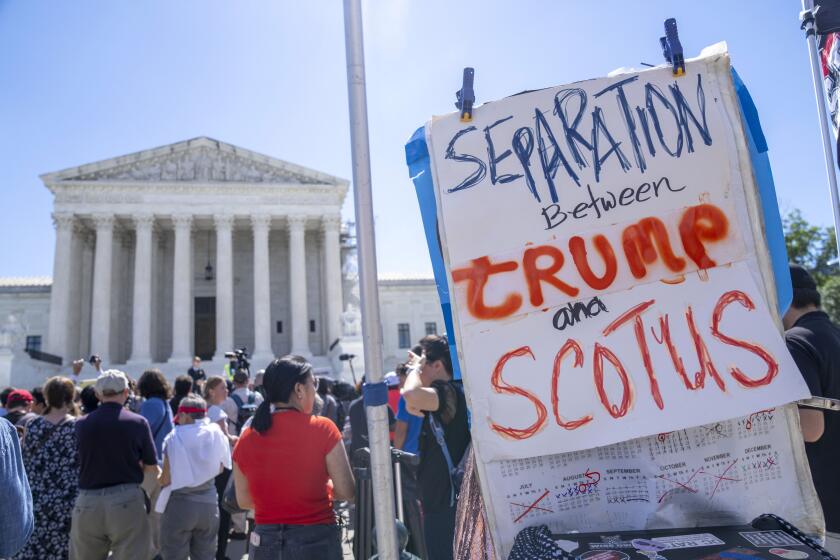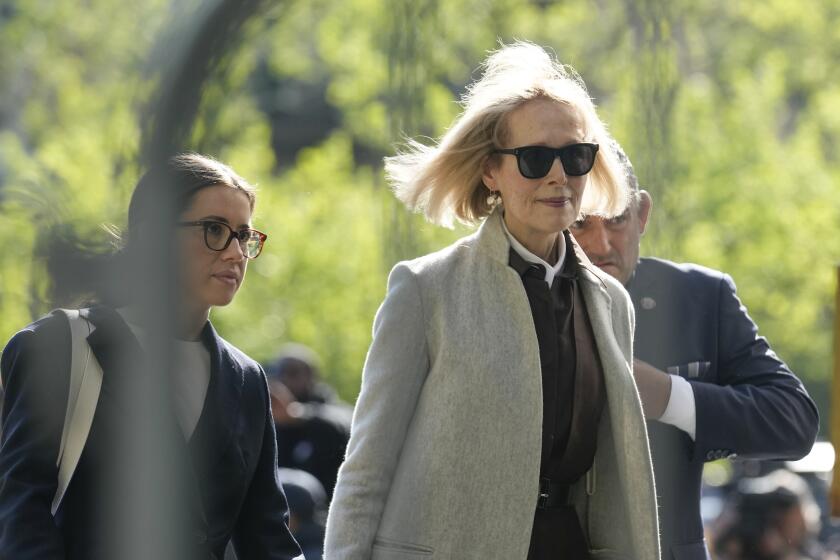Opinion: Trump’s trials are turning all of us into legal scholars

- Share via
If Donald Trump is sentenced in a Manhattan courtroom in September for covering up hush-money payments to a porn star (no longer a certainty, given the Supreme Court’s recent decision on presidential immunity), it may bring closure of sorts to a chapter in American history. But the former president’s legal woes in other courts will continue, and so will the American public’s master class in the law.
The conservative justices granted presidents broad protection for official acts. That appears to include much of the conduct in the federal Jan. 6 indictment.
Some spectators have complained that judges bend over backward for the former president, affording Trump deference that the average person would never enjoy. Others believe that Trump has been victimized simply because he is Trump. Whatever one thinks of the man or his pursuers, all this legal wrangling around him has had a surprising benefit to democracy and the rule of law: People are thinking and talking about those legal questions and many others.
In the more than 50 years I have been trying cases and arguing appeals, only during the O.J. Simpson trial have I seen the media traffic resemble my first-year class in law school as much as it has in recent months. We’re all seeing in real time how courts operate. It’s been fascinating, reminding us that, while imperfect, the law has the potential to be a stabilizing and equalizing force. Who knows — perhaps the spectacle has inspired a few young people to consider law school, and for all the right reasons.
Opinion: The Supreme Court just showed us that Trump is not incompetent. He’s a master of corruption
Don’t laugh off the former president just because he is unhinged. He controls the Republican Party from the MAGA trenches to the halls of Congress and the high court.
Let’s take Trump’s civil trials in Manhattan Federal Court in the defamation suits brought by E. Jean Carroll. She had accused him of sexually abusing her in 1996, and then publicly defaming her. The trials were models for a first-year course in federal civil procedure. We gained a visceral appreciation of statutes of limitation, watched a jury being picked and witnessed lawyers stumble in examining witnesses.
Thanks to Carroll, we also learned about the difference between compensatory and punitive damages and bonding a federal court judgment pending appeal — that is, suspending its enforcement until the appeal is decided. We were even reminded that the law has not abandoned the use of mumbo jumbo, when the trial judge, Lewis A. Kaplan, applied the doctrine of “collateral estoppel” in the second Carroll defamation trial, determining that Trump could not relitigate the issue of liability and that the court would only hear arguments about damages.
Society must work to remove legal barriers like the statute of limitations that initially kept E. Jean Carroll from pursuing her accusation against Donald Trump.
Moving across the street from the federal trial in Manhattan, we watched Justice Arthur F. Engoron preside over a civil trial brought by New York’s Atty. Gen. Letitia James, accusing Trump of exaggerating his wealth. How many of us knew a state attorney general could do that? Did you know before this case that “ill-gotten gains” from business fraud could be recovered for the people of New York state?
And when Engoron rendered a judgment against Trump for more than $400 million, TV network commentators (including me on several occasions) were all over the airwaves explaining how any person could suspend enforcement of a state court judgment by obtaining an appeal bond. We commentators even found ourselves answering public curiosity about such obscure points as how a bonding company works and financially secures itself when it provides a bond.
As we the American people remained riveted by the action in Foley Square — New York’s Court District — we received the equivalent of a first-year criminal law class, watching Justice Juan Merchan preside over Trump’s false business records case. Jurors ultimately convicted Trump on 34 counts of falsifying business records, making him a felon. Sentencing has been delayed to September. Did we know that one person could be convicted 34 times for essentially one cover-up of an alleged fling with a porn star?
This Stormy Daniels case also provided an introductory course in ethics, as lawyers for Trump and the district attorney battled over what circumstances required a judge to recuse — or not — because he and his law clerk made political contributions to a Democratic opponent of Trump. Then we all were along for the ride as Merchan navigated the intricacies of a gag order, and what constitutes contempt of court, and what the penalties should be for contempt. I can almost hear a law professor posing such questions to the class.
Our ethics class continued with a focus on the state’s election case in Georgia, which features a district attorney having hired a prosecutor with whom she had a romantic affair, and allegedly received financial benefits from him as they traveled together (the consequences of that are currently being reviewed by an appellate court, while the trial remains in limbo).
Meanwhile in D.C. and Florida, charges against Trump in the Jan. 6 case and the classified documents case have led to a basic class in constitutional law, with lessons on presidential powers and the 4th Amendment.
What is probable cause to justify a search warrant? Now that the Supreme Court has declared that the president has substantial immunity from prosecution, how will courts apply that in the pending criminal cases against Trump? Does the special counsel, Jack Smith, have the proper authority from Congress to continue his work? Certainly, few of us considered such questions before Trump’s saga posed them.
Whatever the outcome for Trump and the presidential election, as a citizenry we are much better off for having the workings of our courts laid out for the education of the American public.
Mark C. Zauderer has practiced law in New York state for more than 50 years. He is a partner at Dorf Nelson & Zauderer LLP in Manhattan.
More to Read
A cure for the common opinion
Get thought-provoking perspectives with our weekly newsletter.
You may occasionally receive promotional content from the Los Angeles Times.













